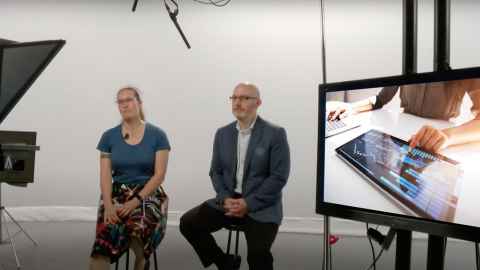Programme overview
At present, mathematical modelling is enjoying a high degree of public awareness, with real-world applications such as COVID-19 and climate modelling frequently appearing in the news.
The Master of Mathematical Modelling will expose students to a broad range of realistic modelling techniques and provide them with expertise in advanced computational tools. Students will also gain fundamental knowledge of the underlying theoretical principles and assumptions.
This programme is available with either a 120- or 180-point pathway. It comprises core Engineering Science and Mathematics courses and a broad range of electives.
Students will also complete a research project worth 45 points.
Find out what our campus locations and facilities have to offer in these videos.
Programme structure
The Mathematical Modelling programme is a cross-faculty collaboration between the Department of Mathematics in the Faculty of Science and the Department of Engineering Science in the Faculty of Engineering and Design. It is available with both 120 and 180-point pathways. The programme includes four core courses and elective courses in Engineering Science, Mathematics and Physics.
Students will also complete a 45-point research project.
Explore the Curriculum Catalogue to find the courses you can take in the following programmes:
You'll also need to meet other requirements, including time limits and total points limits. See Postgraduate enrolment.
Subjects available in this programme
- Mathematical Modelling
2026 entry requirements
My highest qualification is from:
Programme requirements
Minimum programme requirements
Minimum requirements listed here are the likely grades required and do not guarantee entry. We assess each application individually and applicants may require a higher grade to be offered a place.
-
Study optionTaught 120 pointsGrade requiredGPA Grade Point Average 4.0
-
Study optionTaught 180 pointsGrade requiredGPA Grade Point Average 4.0
Further programme requirements
Select your study option:
You must have completed either:
- a Bachelors degree and Postgraduate Diploma, each in a relevant subject and with a Grade Point Average of 4.0 or higher in 60 points above Stage III
- a Bachelors (Honours) degree with a GPA of 4.0 or higher in 60 points above Stage III
- a Bachelors (Honours) degree and passed 60 points with a GPA of 4.0 or higher in a relevant postgraduate diploma or postgraduate certificate provided that the certificate or diploma has not been awarded
You must also have completed 15 points from COMPSCI 130, ENGGEN 131, MATHS 162, and 15 points from ENGSCI 311, 313, 314, MATHS 361, or the equivalent as approved by the Programme Director.
Relevant subjects may include analytics, applied mathematics, artificial intelligence, computer science, data science, engineering, operations research, physics, software engineering, structural engineering, electrical engineering, statistics, or technology.
You must have completed either:
- a relevant Bachelors degree, with a Grade Point Average of 4.0 in 60 points above Stage II
- a relevant Bachelors degree and passed 60 points with a GPA of 4.0 in the Postgraduate Certificate, or Postgraduate Diploma, in Mathematical Modelling (provided the certificate or diploma has not been awarded)
You must also have completed 15 points from COMPSCI 130, ENGGEN 131, MATHS 162, and 15 points from ENGSCI 311, 313, 314, MATHS 361, or the equivalent as approved by the Programme Director.
Relevant subjects include analytics, applied mathematics, artificial intelligence, computer science, data science, engineering, operations research, physics, software engineering, structural engineering, electrical engineering, statistics, or technology.
Other pathways to study
If you do not meet the GPA requirement, you can still gain entry by passing 60 points towards the Postgraduate Certificate in Mathematical Modelling, or the Postgraduate Diploma in Mathematical Modelling, with a GPA of 4.0.
If you do not meet the above entry requirements, but have other relevant experience and think you would be successful in postgraduate study, please contact us to discuss alternative pathways into our programmes.
Programme requirements
Minimum programme requirements
Minimum requirements listed here are the likely grades required and do not guarantee entry. We assess each application individually and applicants may require a higher grade to be offered a place.
-
Study optionTaught 120 pointsGrade requiredGPE Grade Point Equivalent 4.0
One year of postgraduate study
-
Study optionTaught 180 pointsGrade requiredGPE Grade Point Equivalent 4.0
An undergraduate degree
-
QualificationIELTS Academic International English Language Testing SystemScore required6.5
No bands below 6.0.
Further programme requirements
Taught 120 points
You must have completed either:
- One year of postgraduate study, following an undergraduate degree, in a relevant subject, with a GPE of 4.0.
- An undergraduate degree from a recognized institution in a relevant subject, with a GPE of 4.0, and three years of relevant professional experience.
You must have completed an introductory programming course in MATLAB, C, Python, or similar coding language, and an advanced undergraduate course on partial differential equations, or the equivalents as approved by the Programme Director.
Relevant subjects include analytics, applied mathematics, artificial intelligence, computer science, data science, engineering, operations research, physics, software engineering, structural engineering, electrical engineering, statistics, or technology.
If you do not meet the GPE requirement, you can still gain entry by passing 60 points towards the Postgraduate Certificate in Math Modelling, or the Postgraduate Diploma in Math Modelling, with a GPA of 4.0.
How much does a Master of Mathematical Modelling cost per year?
2026 fees
- Domestic students
- NZ$12,854.40*
- International students
- NZ$55,484*
Fees are set in advance of each calendar year and will be updated on this website. Fees are inclusive of 15% GST, but do not include the Student Services Fee, course books, travel and health insurance, or living costs. Amounts shown are indicative only. In addition to the tuition fees, there is a Student Services Fee of $9.44 per point, estimated at $106,558.72 for full-time study (11288 points). Fees will be confirmed upon completion of enrolment into courses.
*Please note: amounts shown are indicative and estimates only.
Find out about financial support information
Scholarships and awards
Find out about the scholarships you may be eligible for.
Student loans and allowances
Are you a New Zealand citizen or resident? You could be eligible for a student loan or allowance.
Cost of living
Get an idea of how much accommodation and general living in Auckland will cost.
Key dates
Please note: We will consider late applications if places are still available. International students should start the application process as early as possible to allow sufficient time to apply for a visa.
Application closing dates
- Semester One 2026
- 8 December 2025
- Semester Two 2026
- 8 June 2026
Start dates
Here are the start dates for the programme.
| Semester One | Starts – 2 March |
|---|---|
| Ends – 29 June | |
| Semester Two | Starts – 20 July |
| Ends – 16 November |
| Semester One | Starts – 1 March |
|---|---|
| Ends – 28 June | |
| Semester Two | Starts – 19 July |
| Ends – 15 November |
Other important dates
See important dates for the academic year, including orientation, enrolment, study breaks, exams, and graduation.
Where could this programme take you?
You will be competent in interdisciplinary mathematical modelling and familiar with advanced computational techniques and methodologies. You may take up specialist roles in industrial R&D departments, government advice offices and quantitative forecasting.
Jobs related to this programme
- Consultant
- Data Scientist
- Meteorologist
- Data Engineer
- Entrepreneur
- Chief Technology Officer
- R&D Engineer
- Forecasting Analyst

Read about the MMathModel programme in detail and discover whether it's the right study path for you.
Find out moreStudent career planning service
Once you become a student at the University, you can get help with planning and developing your career from Career Development and Employability Services.
Experience the University

Meet the programme directors
Learn about the new MMathModel from Dr Richard Clarke from the Faculty of Engineering and Design and Professor Hinke Osinga from the Department of Mathematics.
Do you need help?
Can’t find the answer in AskAuckland?
Need to speak to someone?
You can phone us directly.
- Auckland:
- (09) 923 5025
- Outside Auckland:
- 0800 61 62 63
- International:
- +64 9 373 7513


